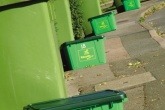Concerns raised over safety of waste operatives
Concerns have been raised by the waste and recycling sector over how to keep waste operatives safe during the coronavirus outbreak.
Waste workers have been deemed ‘essential’ by the government following calls from the Environmental Services Association (ESA) that waste workers should be exempt from instructions to stay at home to minimise disruption to waste and recycling collections across the country.
 The UK waste and recycling sector issued a joint statement on Wednesday (25 March), calling on residents to help protect waste workers by following the government’s advice on presenting waste during the outbreak.
The UK waste and recycling sector issued a joint statement on Wednesday (25 March), calling on residents to help protect waste workers by following the government’s advice on presenting waste during the outbreak.
Currently, those with symptoms are asked to double-bag their waste, especially personal waste such as used tissues or disposable cleaning clothes, and leave it for 72 hours before placing it out for collection.
ESA Executive Director Jacob Hayler said: “ESA members take the safety of their workforce incredibly seriously and we have collectively been assured by Defra that it is safe for household waste collections to continue as long as the public follow government guidance on the proper disposal of waste during the COVID-19 crisis.”
But even if contact with the public is reduced, workers spend a lot of time in close proximity, an issue the ESA has raised with the Department for Environment, Food and Rural Affairs (Defra) and the WISH (Waste Industry Safety and Health) Forum.
“Clearly, many waste workers are providing an essential frontline service and this isn’t something they can do from home,” says Hayler. “There is a present challenge in helping colleagues working in close quarters, such as collection crews, to practice correct social distancing from each other while on their rounds, but WISH is currently working on suitable industry-level guidance. This is also an issue the ESA has raised directly with Defra and we are awaiting further advice. In the meantime, individual ESA members are developing and deploying their own safe working practices, which staff are advised to follow.”
As stated, councils and waste management companies are taking precautions to try to reduce the risk of transmission between operatives. “In terms of social distancing councils are putting in place arrangements that are suitable for their operations,” says Lee Marshall, CEO of LARAC (the Local Authority Recycling Advisory Committee). “This generally includes restricting the number of people in the depot at the start and end of the day to collect keys and equipment, extra PPE [Personal Protective Equipment] and cleaning products for the cabs and then assessing the crew numbers on the rounds and maybe reducing to driver only or a driver plus one loader where this will not have a significant impact on the collections.”
The advice from LARAC has been echoed by that of the National Association of Waste Disposal Officers, with a spokesperson saying: “Our members are advised to follow central government guidelines and industry best practice whilst delivering frontline services. There are a number of practices that could help, including PPE equipment, cleaning/hygiene products and practices, minimising staff rotation and movements and staggering start/finish times”.
One of the key measures that has been put forward to reduce transmission between workers is widespread testing for coronavirus, which would identify if anyone is carrying the virus undetected, allowing them to then self-isolate and prevent transmission to their colleagues.
Calls have been made for the rapid deployment of testing to frontline NHS workers, and it would appear a sensible precaution to do the same for waste operatives when widespread testing becomes available. “If national capacity for Covid-19 testing increases, then it seems sensible to use a risk-based criteria to prioritise testing for key workers across all essential sectors, not just recycling and waste management,” says Hayler.






